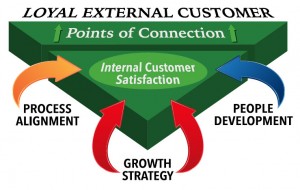Tough question, “Why do managers fail?”
The curious thing is that managers often fail right after successes.
Why is that? Is the Peter principle alive and well?
The Peter principle states that “managers rise to the level of their incompetence.” Managers are promoted “based on the candidate’s performance in their current role, rather than on abilities relevant to the intended role.” This could provide an answer to the question, why do managers fail.
This answer to the question why do managers fail is completely unsatisfactory. It does cast light on an issue, but really doesn’t help.
The answer does make for a good sound bite though. “Oh, the Peter principle is at work. That’s why he didn’t make it in the role.”
Why didn’t he make it in his role?
What didn’t he know, do, have, or was properly skilled in?

If you are in this position, that is, in which you wonder if you’re in over your head, congratulations! You’ve done some things right.
But the question why do managers fail still needs a good answer. One you can use.
Even if you are a business owner, start-up founder in which no one “promoted” you directly, in fact, you were promoted by your success in the market. That success can make your rise to the level of not knowing what to do even more pronounced with all the complexities and demands of the new roles being thrust on you.
Okay, you were promoted to President, VP, Director, GM, COO , CEO or some other management role.
What now?
You know that the stress, all those in-coming requests will start to pile up, the demands for action, demands on your time will increase.
As a mentor of mine once said, “sales and money solve all kinds of ills in a company.” This is the easy case, maybe even why you were promoted.
The hard case is when things go south. Sales fall, projects fail, margins shrink or go negative, growth declines. Now what do you do?
I’ve noticed that when people find themselves under stress, they fall back into what they know best and inside their comfort zones.
Those that came up through the engineering and technical ranks fall back into technology and can get caught in the minutia.
Those that came up through sales want to “get back out there and sell.”
Those from finance want to dig into the numbers.
And of course, read that book that’s been on your list for a while.
None of these are “bad” per se. However, falling back into comfort zones is not going to help.
Consider this point when faced with the question, “why do managers fail?”
At the senior level, a manager needs to attend to all aspects of the business their operation,their group.
What are “all aspects?”
 People, strategy, processes: staffing and skill levels, operations, financials, sales and marketing, internal customers, external customers, partners, vendors, market trends, competition, taxes, regulations, and more.
People, strategy, processes: staffing and skill levels, operations, financials, sales and marketing, internal customers, external customers, partners, vendors, market trends, competition, taxes, regulations, and more.
Ron Carucci writing for Harvard Business Review reports on a 10-year study on what great executives know and do.
Here’s the short list from the article:
They know the whole business. They focus on “strengthening seams” in the business, that is the connection points through communication and processes. They approach issues systematically.
They are great decision makers. They know how to prioritize, which means they have plans. They know how to delegate. They have teams in well defined roles with clear plans for execution. According to the article, ” Making good decisions seems to be a comparatively rare skill.” I wonder if thoughtful planning might be behind making good decisions.
They know their industry. They can “see” trends in multi-year horizons. They have innate curiosity.
They form deep, trusting relationships. They “form deep connections with superiors, peers, and direct reports, studying and meeting the needs of key stakeholders” and are excellent and frequent communicators.
Why do managers fail?
Managers fail because they do not learn their job. They do not know themselves as well as they need for the role.
Managers who fail do not continually improve themselves–through learning, reading, talking with and listening to others with expertise they don’t have, and getting coached as necessary.
 If you see yourself in any of this, what are going to do?
If you see yourself in any of this, what are going to do?
- What books, blogs, articles do you read regularly?
- What new habits, beliefs, skills, attitudes do you need for your role?
- What seminars, podcasts, webinars, classes, events, talks do you attend?
- What plans have you directly developed for yourself and your team?
- What do you do to regularly refine and communicate the plans?
- What coaching do you get? (name a world class person in any sport, music, theater, business does not use, regularly use a coach, mentor.)
Now for the big question: What are you doing to learn your craft?
Take this quick self assessment on delegation in Your Leadership Journey right here on PhilBride.com.
Helping Leaders Breakthrough
“Dominate your life with Focus, Decision and Execution.”




